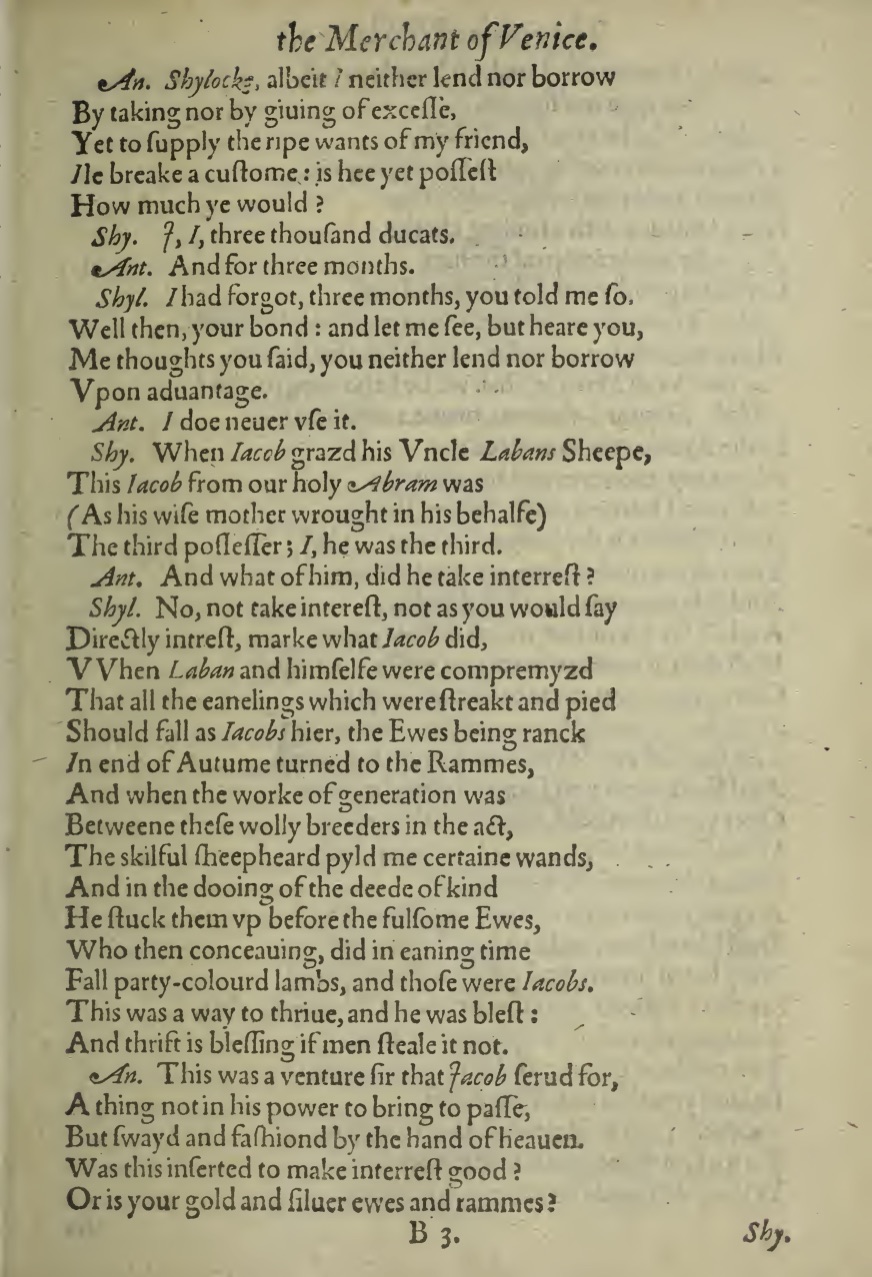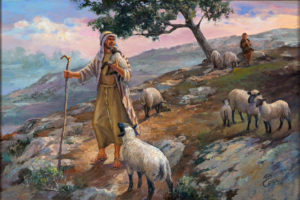- “Genesis 30-31 Thus the Man Increased Greatly and Had Large Flocks.” The Scripture Says, 5 Feb. 2017, thescripturesays.org/2016/01/10/genesis-30-31-thus-the-man-increased-greatly-and-had-large-flocks/.
- Usury was a contentious topic in the early 17th century. The Christian belief was that usury was sinful and unjust, and this belief led to anti-Semitism towards Jews who loaned money with interest. Some Christian leaders such as Martin Luther and John Calvin during the Reformation allowed small interest, but the Catholic Church, predominate in Venice, continued to oppose usury. Antonio, presumably Catholic, did not believe in usury. “Usury in Christian History.” Your Faith Your Finance, www.yourfaithyourfinance.org/money-and-faith/usury-and-the-theology-of-money/usury-in-christian-history/.
- The first axiom of Jewish economic theory is "participation in the creative process." The axiom draws from the idea that "Man is created in God's image." The Jewish interpret this to mean that they are responsible for also being creative and innovative, since God created the world, and they were created in his image. Shylock values Jacob's ingenuity and creation of an inventive method in which he could breed sheep for profit. Sauer, Corinne, and Robert M Sauer. “Jewish Theology and Economic Theory.” Religion and Liberty, vol. 17, no. 1, 20 July 2010, www.acton.org/pub/religion-liberty/volume-17-number-1/jewish-theology-and-economic-theory.
- One thing to notice in Shylock's speech vs Antonio's speech is the capitalization of words having to do with sheep, specifically "Ewe," "Ram," and "Sheep." This is a deliberate move by Shakespeare, as it is a commentary on the Christian opinion of the Jewish faith. The word Ewe phonetically resembles the word Jew. In Venice, from 1516 until 1797, Jews were only allowed to live in a place called the Jewish Venetian Ghetto, which was locked at night. Jews were restricted to money loaning and pawning while living in the ghetto. There are parallels between the sheep being herded and the Jewish Venetians being corralled into the ghetto in the evening. Shylock's capitalization of sheep terms reflects this self-alignment, while Antonio leaving the terms uncapitalized can symbolize a disregard to the Jewish faith. Caravalho, Liah. “Understanding the Venetian Ghetto from a Historical and Literary Perspective.” Library of Congress, 21 Mar. 2017, blogs.loc.gov/law/2017/03/understanding-the-venetian-ghetto-from-a-historical-and-literary-perspective/.
- Both Antonio and Shylock believe the spotted sheep are a blessing. Shylock attributes the blessing to Jacob's keen intellect and creative ideas, and Antonio sees them as a gift of god, but since both men are merchants, they see a profit as a blessing nonetheless.
- Shylock is likely referencing The Ten Commandments, particularly the 8th commandment, "You must not steal." Although The Ten Commandments are a recognized aspect of both Christianity and Judaism, they are especially valued by the Jewish faith, and the protection of one's private property is considered to be an important aspect of Jewish economic theory. Sauer, Corinne, and Robert M Sauer. “Jewish Theology and Economic Theory.” Religion and Liberty, vol. 17, no. 1, 20 July 2010, www.acton.org/pub/religion-liberty/volume-17-number-1/jewish-theology-and-economic-theory.
- The story of Jacob and the flock of sheep, taken from Genesis 30, is interpreted differently between those of Christian and Jewish faith. As Antonio puts it, the Christian belief is that God was the one who made the lambs spotted, not Jacob. Biblical scholars think that the rods Jacob put up simply corralled the sheep together, and it was God that made the sheep spotted, not Jacob. The different interpretation of this story explains the Christian view of money making in the early 17th century. It was not uncommon for Christians to willingly take risks with their money and leave it up to God to provide. Antonio's willingness to lend money to Bassanio, notorious for his debt, reflects this. “Jacob's Strange Deal (Genesis 30:25-43).” Bible.ucg.org, bible.ucg.org/bible-commentary/Genesis/Jacob's-deal-with-Laban-concerning-the-flocks/.

